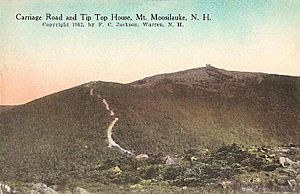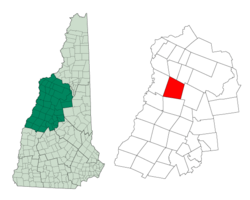Benton, New Hampshire facts for kids
Quick facts for kids
Benton, New Hampshire
|
|
|---|---|
|
Town
|
|

Mount Moosilauke in 1912
|
|

Location in Grafton County, New Hampshire
|
|
| Country | United States |
| State | New Hampshire |
| County | Grafton |
| Incorporated | 1764 |
| Area | |
| • Total | 48.4 sq mi (125.4 km2) |
| • Land | 48.2 sq mi (124.8 km2) |
| • Water | 0.2 sq mi (0.6 km2) 0.47% |
| Elevation | 1,272 ft (388 m) |
| Population
(2020)
|
|
| • Total | 374 |
| • Density | 8/sq mi (3.0/km2) |
| Time zone | UTC-5 (Eastern) |
| • Summer (DST) | UTC-4 (Eastern) |
| ZIP codes | |
| Area code(s) | 603 |
| FIPS code | 33-05060 |
| GNIS feature ID | 0873544 |
Benton is a small town in Grafton County, New Hampshire, United States. In 2020, about 374 people lived there.
Benton is located in the beautiful White Mountains. Much of the town is surrounded by the White Mountain National Forest. The famous Appalachian Trail, a long hiking path, also goes through Benton.
Contents
History of Benton
Benton was first given permission to be a town on January 31, 1764. This was granted by Governor Benning Wentworth. It was first called "Coventry." Many early settlers came from Coventry, Connecticut. They arrived around the time of the American Revolution, a war for independence.
Later, in 1840, Governor Isaac Hill suggested changing the name. The town was renamed Benton on December 4, 1840. This was to honor Thomas Hart Benton. He was a senator from Missouri who supported the idea of American westward expansion. This meant people believed the United States should expand across the continent.
The land in Benton is rough and mountainous. This made it hard for farming. But the town had good spots for water power and lots of trees. By 1859, there were five sawmills. They produced a lot of lumber from the forests.
A railroad, the Boston, Concord & Montreal Railroad, also ran through the town. The village of Glencliff was once part of Benton.
Mount Moosilauke's Hotel
In 1860, a hotel called the Prospect House was built on top of Mount Moosilauke. It was later renamed the Tip Top House. This stone hotel could host 35 hikers.
In 1870, a special road for carriages was built to the summit. Because of this, the hotel was made bigger in 1872. It could then hold 50 guests. In 1920, the hotel and its land were given to Dartmouth College. Sadly, the Tip Top House burned down in 1942.
Geography of Benton
Benton is in the northwestern part of New Hampshire. It is located in the northern area of Grafton County. The town covers about 125.4 square kilometers (48.4 square miles). Most of this area is land, with a small amount of water.
The town's water flows mainly into Oliverian Brook and the Wild Ammonoosuc River. The Baker River also drains a small part of the southeastern corner. The water from Oliverian Brook and the Wild Ammonoosuc River eventually flows into the Connecticut River. This is part of the Connecticut River watershed. The small part in the southeast flows into the Merrimack River watershed.
The highest point in Benton is the top of Mount Moosilauke. It is about 1,464 meters (4,802 feet) above sea level. New Hampshire Route 116 crosses the northern part of Benton.
Benton's Climate
Benton has a climate known as a warm-summer humid continental climate. This means it has warm summers and cold, snowy winters.
The hottest temperature ever recorded in Benton was 35 degrees Celsius (95 degrees Fahrenheit) on July 15, 1995. The coldest temperature recorded was -34 degrees Celsius (-29 degrees Fahrenheit) on January 27, 1994.
| Climate data for Benton, New Hampshire, 1991–2020 normals, extremes 1965–2012 | |||||||||||||
|---|---|---|---|---|---|---|---|---|---|---|---|---|---|
| Month | Jan | Feb | Mar | Apr | May | Jun | Jul | Aug | Sep | Oct | Nov | Dec | Year |
| Record high °F (°C) | 64 (18) |
63 (17) |
78 (26) |
88 (31) |
89 (32) |
93 (34) |
95 (35) |
94 (34) |
93 (34) |
81 (27) |
71 (22) |
65 (18) |
95 (35) |
| Mean maximum °F (°C) | 48.6 (9.2) |
50.2 (10.1) |
60.7 (15.9) |
76. (24) |
81.9 (27.7) |
86.8 (30.4) |
87.6 (30.9) |
86.0 (30.0) |
81.7 (27.6) |
73.5 (23.1) |
63.8 (17.7) |
52.8 (11.6) |
89.3 (31.8) |
| Mean daily maximum °F (°C) | 26.4 (−3.1) |
29.2 (−1.6) |
37.8 (3.2) |
51.5 (10.8) |
64.3 (17.9) |
72.5 (22.5) |
77.3 (25.2) |
75.9 (24.4) |
68.5 (20.3) |
55.7 (13.2) |
42.9 (6.1) |
32.4 (0.2) |
52.9 (11.6) |
| Daily mean °F (°C) | 16.9 (−8.4) |
19.0 (−7.2) |
27.8 (−2.3) |
40.8 (4.9) |
53.0 (11.7) |
61.5 (16.4) |
66.5 (19.2) |
64.8 (18.2) |
57.2 (14.0) |
45.3 (7.4) |
34.4 (1.3) |
23.7 (−4.6) |
42.6 (5.9) |
| Mean daily minimum °F (°C) | 7.4 (−13.7) |
8.9 (−12.8) |
17.8 (−7.9) |
30.1 (−1.1) |
41.8 (5.4) |
50.5 (10.3) |
55.7 (13.2) |
53.6 (12.0) |
45.8 (7.7) |
34.9 (1.6) |
25.9 (−3.4) |
15.0 (−9.4) |
32.3 (0.2) |
| Mean minimum °F (°C) | −15.6 (−26.4) |
−10.9 (−23.8) |
−3.7 (−19.8) |
18.0 (−7.8) |
28.0 (−2.2) |
36.2 (2.3) |
43.1 (6.2) |
40.0 (4.4) |
30.8 (−0.7) |
22.2 (−5.4) |
9.4 (−12.6) |
−7.7 (−22.1) |
−17.9 (−27.7) |
| Record low °F (°C) | −29 (−34) |
−26 (−32) |
−18 (−28) |
3 (−16) |
18 (−8) |
27 (−3) |
32 (0) |
29 (−2) |
22 (−6) |
12 (−11) |
−2 (−19) |
−28 (−33) |
−29 (−34) |
| Average precipitation inches (mm) | 2.40 (61) |
2.11 (54) |
2.75 (70) |
3.25 (83) |
3.45 (88) |
3.84 (98) |
4.42 (112) |
4.36 (111) |
3.52 (89) |
4.54 (115) |
3.46 (88) |
3.15 (80) |
41.25 (1,049) |
| Average snowfall inches (cm) | 17.4 (44) |
14.4 (37) |
14.2 (36) |
2.9 (7.4) |
0.1 (0.25) |
0.0 (0.0) |
0.0 (0.0) |
0.0 (0.0) |
0.0 (0.0) |
1.2 (3.0) |
3.6 (9.1) |
17.6 (45) |
71.4 (181.75) |
| Average extreme snow depth inches (cm) | 11.0 (28) |
12.0 (30) |
11.5 (29) |
3.4 (8.6) |
0.0 (0.0) |
0.0 (0.0) |
0.0 (0.0) |
0.0 (0.0) |
0.0 (0.0) |
0.4 (1.0) |
2.1 (5.3) |
9.0 (23) |
16.6 (42) |
| Average precipitation days (≥ 0.01 in) | 12.4 | 9.4 | 11.0 | 11.2 | 13.4 | 14.0 | 12.9 | 11.1 | 10.8 | 12.6 | 11.3 | 12.2 | 142.3 |
| Average snowy days (≥ 0.1 in) | 13.0 | 10.2 | 8.9 | 3.2 | 0.2 | 0.0 | 0.0 | 0.0 | 0.0 | 1.4 | 4.7 | 10.8 | 52.4 |
| Source 1: NOAA | |||||||||||||
| Source 2: XMACIS2 (mean maxima/minima, snow depth 1981–2010) | |||||||||||||
Population of Benton
| Historical population | |||
|---|---|---|---|
| Census | Pop. | %± | |
| 1840 | 413 | — | |
| 1850 | 478 | 15.7% | |
| 1860 | 459 | −4.0% | |
| 1870 | 375 | −18.3% | |
| 1880 | 378 | 0.8% | |
| 1890 | 244 | −35.4% | |
| 1900 | 209 | −14.3% | |
| 1910 | 219 | 4.8% | |
| 1920 | 177 | −19.2% | |
| 1930 | 255 | 44.1% | |
| 1940 | 262 | 2.7% | |
| 1950 | 247 | −5.7% | |
| 1960 | 172 | −30.4% | |
| 1970 | 194 | 12.8% | |
| 1980 | 333 | 71.6% | |
| 1990 | 330 | −0.9% | |
| 2000 | 314 | −4.8% | |
| 2010 | 364 | 15.9% | |
| 2020 | 374 | 2.7% | |
| U.S. Decennial Census | |||
In 2000, a census counted 314 people living in Benton. There were 91 households and 59 families. Most people living in Benton were White (97.45%).
About 30.8% of households had children under 18 living with them. Many households (56.0%) were married couples. The average household had about 2.43 people.
The population was spread out by age. About 18.8% were under 18 years old. A large group, 32.5%, were 65 years or older. The average age in Benton was 48 years old.
See also
 In Spanish: Benton (Nuevo Hampshire) para niños
In Spanish: Benton (Nuevo Hampshire) para niños
 | William M. Jackson |
 | Juan E. Gilbert |
 | Neil deGrasse Tyson |

